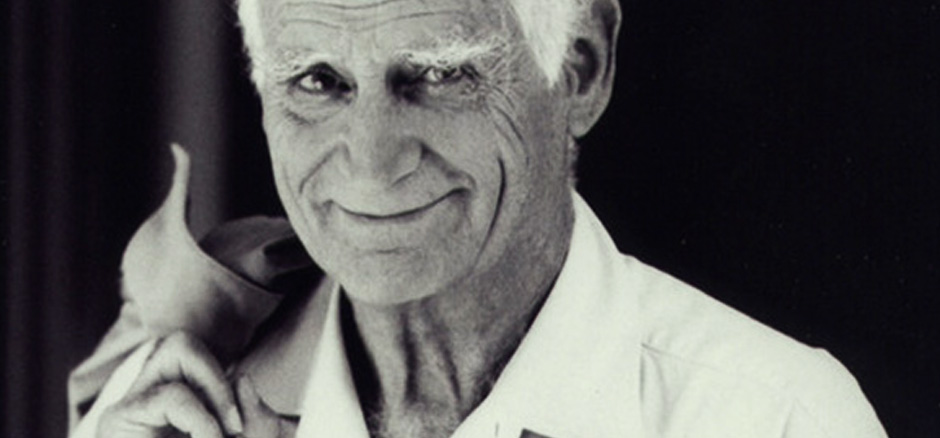
Read this captivating reflection of Chris Watkin on why he chose to write on Michel Serres in his recently published Michel Serres: Figures of Thought.

I woke this morning to the news that Michel Serres, philosopher, mountaineer, broadcaster, grandfather, historian of science, lover of rugby, mathematician, and inimitable writer, has passed away at the age of 88. This sad news comes at a moment when I am deeply immersed in Serres’ writing, putting the finishing touches to a monograph on his work. Throughout today I have found myself reflecting on the fascination that Serres has held for me ever since my first, felicitous encounter with his writing.
I had never written a full-length academic monograph on a single thinker before I decided to embark on Michel Serres: Figures of Thought. I may never do so again. So what led me to spend four years of my life with my head buried in the writing of a thinker who had never featured in a course I have taken, whose books had never been recommended to me, and whom I never met? This post is my attempt to answer those questions for myself.
My first engagement with Serres’ writing came as I was researching French Philosophy Today, my book on the figure of the human in contemporary French thought. I came to him through reading Bruno Latour, which is to say that I came to Serres late. Time was that those familiar with Latour’s work would, likely as not, become aware of him through his intellectual friendship with Serres. The tables have now decisively turned, and if you are familiar with Serres there is a good chance that you came to him through the gateway of Latour.
The Great Story
What drew me to Serres in those early days was his account of the ‘Great Story’ of the universe branching from the Big Bang to the present day and beyond. It is significant that Serres does not encompass his thought with one or more fundamental concepts (such as ‘being’, ‘immanence’ or the ‘event’), but with a story. This is an inevitable consequence of his determination to dispense with meta-discourse. His preference for story as a frame for his thought is in part a reaction against the sort of philosophy that thinks only in substantives and infinitives – ‘to be and to have, consciousness, nothingness, thought, will… nouns that are not declined, infinitives that are not conjugated’ (Pan 93) – and that throws all other language in the bin (Pan 95; see also TI 226/TK 149). These nouns are the ‘statues’ and ‘fetishes’ of philosophy (Ec 163/C 110), causing it to speak a telegraphic language – ‘Me arrive tomorrow’, ‘Me be ego’, ‘Being and nothingness’ – that Serres likens to playing the piano while wearing boxing gloves (Pan 94). He takes narrative out of an anthropocentric framework in a way that is neither speculative nor arbitrary, enchanting the universe not through fanciful myth but through information theory and fluid dynamics.
Style
Although I did not yet understand the pull that Serres’ thought was to have on me, in those early days I quickly warmed to his style and to particular details of his biography. While his writing is complex, rich and demanding, its rigour comes not from the deadening fog of multisyllabic philosophical jargon that obscures much theoretical discourse, but from a desire for precision in the everyday. When Bruno Latour challenges Serres that his style is ‘considered difficult, elusive’, he replies that ‘I remain as much as possible in everyday language – I simply use it in all its amplitude’ (Ec 41/C 24). What he means is quite straightforward. When he writes about sailing or woodwork, he uses the everyday vocabulary of the seaman and the carpenter, which to the rest of us may appear affected and forbidding: ‘The average reader may complain that he has to look things up in the dictionary, but the sailor and the carpenter will rejoice that they are respected’ (Ec 138/C 92). If our own area of expertise is misrepresented or improperly discussed we think it ignorance; if another’s area of expertise is properly discussed we are all too quick to dismiss it as obscurantism or affectation.
From the beginning I was drawn to a lack of grand posturing in Serres’s style. Hand in hand with his embrace of precise, everyday language is an antipathy to metalanguage. The terms that recur in his writing – the parasite, noise, translation, Hermes – have not ossified into the sort of signature concepts that attach themselves to other philosophers, such as ‘Epicurus’s clinamen, Descartes’ piece of wax, Rousseau’s general will, Merleau-Ponty’s flesh, Derrida’s deconstruction, René Girard’s mimetism, etc.’ (Pan 360). Serres is quick to dismiss such signature concepts, arguing that ‘I have no logo, no brand’ (Pan 30) and ‘I avoid metalanguage, because usually it is only used for advertising. What’s the point of saying, “I just did this or that”? If one really does it, it’s obvious’ (Ec 136/C 91, translation altered). Serres’ approach is also blessedly free of the self-aggrandizing periodisation that blights the thought of those who ‘divide everything into “before me, and then after my works”’, engaging in a ‘self-promoting mania’ that, once more, belongs, if anywhere, in the world of advertising (Ec 211/C 145).
Costly conviction
My fascination with Serres’s thought was further strengthened by the way in which all of life can be found on the pages of his books, and all of Serres’s own life is implicated in his philosophical commitments. Here is an author who can write affectionately about the relationship between a grandfather and a grand-daughter, and an academic who can remain sober in a crowd intoxicated by scholastic one-upmanship or theoretical partisanship. Here is an intellectual who feels more at home with sailors, labourers and farmers than fellow intellectuals: ‘When I got married, for example, I invited all the workers from the family firm’ (Pan 58). Here is a writer who stands by his convictions even when they are unpopular in his immediate milieu, and even when they come at a personal cost, who resigned his post in the French Navy over the military use of atomic weapons, and who struggled for many years to find a post in a philosophy department because of his unconventional refusal to market himself as a serial expositor of canonical thinkers. Serres warns his readers never to trust clean-handed critics, for unlike Diogenes ‘they have abandoned neither coat, nor money, nor petty power nor their mediocre glory’ (OG 216/G 115; see also D 65-6). He is not among that number; his choices and his convictions have not come cheaply.
Willingness to be unfashionable
Here is an academic unfashionably sceptical of the May 1968 student riots. Finding himself chair of the États généraux de l’Université (a national conference convened at the height of the events of ’68 to rethink the institution of higher education in France) Serres employs a reflexive verb to remark how ‘I found myself presiding over the sitting’, and quips that ‘there I was, the boss! I had a lot of fun. But I never belonged to any group’ (Pan 57), concluding that it was ‘the only time I entered into politics, really’ (Pan 57). Le Système de Leibniz struck an optimistic and only subtly political note at the height of the politically charged events of 1968. Its gradualist and optimistic pronouncements such as ‘the more we advance in knowledge, the more we discover with joy a better world: in fact, the more we constitute it as such’ (SL 389) were never likely to find an eager audience among militant revolutionary intellectuals.
In an age of politicised philosophy, from Sartre’s ‘engagement’ through the Marxisms of the ’68 generation and beyond, here is a thinker who rarely displays the sword-wielding, tub-thumping agonistics that characterise the ambient critical tribalism, and who abhors the political engagement common among his peers. ‘For me’, he warns in Solitude, ‘political decisions were synonymous with mass deaths’ (Sol 119), and his politics are formed more by the bombs dropped on Hiroshima and Nagasaki than by the events of ’68. Whether or not his readers share this view, this equation of grand politics with mass slaughter does make sense of his reluctance to wade into political debates all guns blazing.
By Chris Watkin
Originally published on https://christopherwatkin.com/2019/06/02/why-michel-serres-a-personal-reflection/

Christopher Watkin provides a true overview of Serres’ thinking. Using diagrams to explain Serres’ thought, the first half of the book carefully explores Serres’ ‘global intuition’ – how he understands and engages with the world – and his ‘figures of thought’, the repeated intellectual moves that characterise his unique approach. The second half explores in detail Serres’ revolutionary contributions to the areas of language, objects and ecology.

Christopher Watkin is a Senior Lecturer at Monash University, Melbourne, Australia, where he teaches across French and Literary Studies. He is the author of a number of books in modern and contemporary thought, including Phenomenology or Deconstruction? (2009), Difficult Atheism (2011), and French Philosophy Today: New Figures of the Human (2016) and Michel Serres: Figures of Thought (2020). Chris is currently working on a project interrogating the concepts of freedom and liberation in contemporary thought and society in the light of what has been called the Western “emancipation narrative”. He blogs about philosophy and academic research at christopherwatkin.com, and you can find him on Twitter @DrChrisWatkin.
Abbreviations
BOP The Birth of Physics
C Conversations on Science, Culture and Time
Ec Éclaircissements
GB Le Gaucher boiteux
Her L’Hermaphrodite
In L’Incandescent
Inc The Incandescent
LRE Le retour éternel
NP La Naissance de la physique dans le texte de Lucrèce
P Le Parasite
Pan Pantopie: de Hermès à Petite Poucette
Par The Parasite
PT ‘Panoptic Theory’
R Rome : le livre des fondations
Ro Rome: The First Book of Foundations
SL Le Système de Leibniz et ses modèles mathématiques
Sol Solitude
T Thumbelina
TI Le Tiers-instruit
TK The Troubadour of Knowledge
VB Variations on the Body
VSC Variations sur le corps




